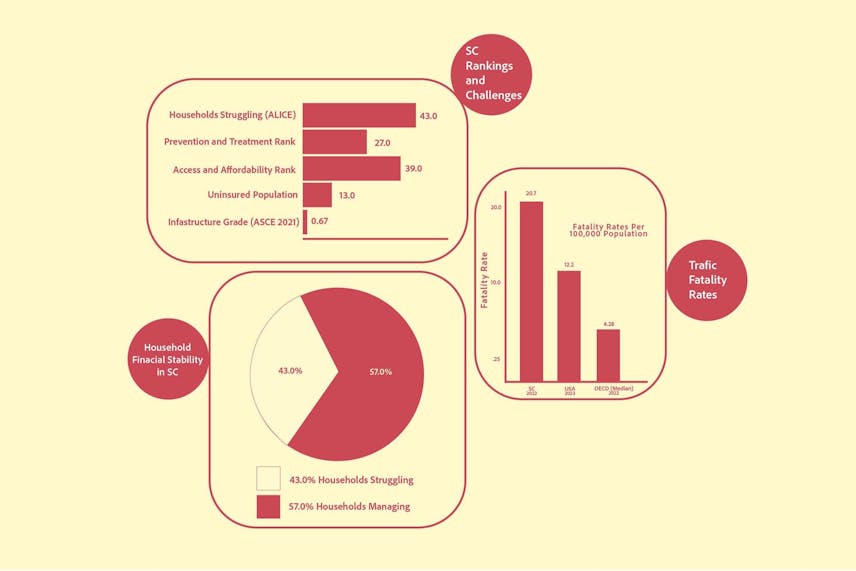"Crap." That’s how some South Carolina Republican representatives described their own state budget.
In March 2025, during South Carolina's budget debate, Rep. April Cromer called the proposed $14 billion plan "chock full of crap."
For students at USC and people across the state, that last line hits close to home. This infighting over budgets isn’t political theater; it’s a direct threat to our ability to build a life here. The intra-party feud has left a vacuum of leadership, and Democrats have an opening to step in and solve tangible problems.
The schism within the SCGOP is no secret. On one side, you have the self-styled Freedom Caucus, a group whose strategy revolves around obstructionism and headline-grabbing stunts — like a 10-cent budget cut. On the other hand, you have the establishment Republicans who, while deeply conservative, seem to grasp that the basic functions of government must continue.
This is a crippling dysfunction; while establishment Republicans pushed for a tuition freeze to help students and families, some Freedom Caucus members fought it, using it as a bargaining chip for their own priorities, like increasing funding for the Confederate military museum.
For a USC student staring down another tuition hike, this isn't about conservative principles; it's about a ruling party so consumed by its internal battles that it can't deliver the basic services folks need. This is the opportunity. When a party is fighting itself rather than governing, it leaves the field wide open for an alternative — hopefully a competent Democrat.
However, that alternative cannot be a bog-standard Democratic shill. A campaign in South Carolina focused on divisive culture war battles that dominate cable news will fail. This is simply a fact.
Instead, Democrats must become the party of pragmatism, of populism, of paving the dang roads. They need to build a coalition of frustrated parents, struggling small business owners and young graduates who are tired of seeing their state at the bottom of every meaningful list — college affordability, healthcare outcomes, decent wages and even safe roads.
The state's infrastructure is a prime example. The American Society of Civil Engineers' 2021 report card gave South Carolina a "D+," citing over 745 bridges and 3,786 miles of highway in poor condition, and in 2022, our state had the highest rate of traffic fatalities in the entire country.
Then there is healthcare, where South Carolina consistently ranks in the bottom 15. Nearly 13% of the state population is uninsured, and the Commonwealth Fund’s 2025 Scorecard ranked South Carolina's state profile 36th. South Carolina ranks 39th in access and affordability and 27th in prevention and treatment.
The economic reality for many is just as bleak. The United for ALICE project revealed that a staggering 43% of households in South Carolina cannot afford the basics. For a USC graduate with student loans and an entry-level salary, staying in South Carolina is becoming a financial nightmare. A Democrat should be holding rallies in front of crumbling bridges in the Lowcountry and outside underfunded schools in the Pee Dee, asking a simple question, "Where is your tax money going?"

The answer is that it's being squandered by a legislature more focused on banning books than on building an economy that works for its people.
But this brand of populist politics has a proven track record in even redder states. Look at Gov. Andy Beshear in Kentucky. He won and was re-elected by focusing on actual issues such as jobs, infrastructure and disaster relief. He talks about “Team Kentucky,” not “Team Democrat.”
Look at former Louisiana Gov. John Bel Edwards, a pro-life, pro-gun Democrat who won two terms by focusing on practical governance, expanding Medicaid and working with Republicans to solve real problems. When Democrats offer an actual alternative focused on economic well-being, they can win anywhere.
The message for a Democratic contender is simple: Stop letting the national Democrat party dictate the terms of the debate. The average voter in Orangeburg or Anderson likely isn’t focused on the theory on gender; they're probably worried about the cost of groceries, the safety of the roads their kids' school bus drives on and whether they can see a doctor without going bankrupt.
The GOP's internal chaos has created the single greatest political opportunity in a generation. But to seize it, Democrats can't just be the opposition; they must be the alternative. The current generation of USC students will inherit this state, and they need candidates who look and sound like South Carolina, leaders more concerned with our crumbling bridges than with national political debates.
If you are interested in commenting on this article, please send a letter to the editor at sagcked@mailbox.sc.edu.

